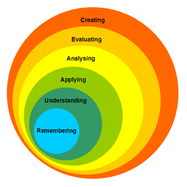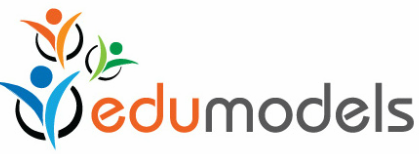|
I recently attended an really inspiring conference with the theme of transforming our learning experiences at Queen’s. After three full days, I was not disappointed - and I’m excited to share! One of the keynote speakers, Eric Mazur, was a physics prof from Harvard. Mazur has been working in the university circuit for nearly 30 years, and has earned a reputation for reforming lectures to be more interactive, and assessment to be more relevant. Mazur opened with reference to this funny sketch on the "five minute university" by "Father Guido Sarducci" (total throwback SNL character), and sadly the sketch is still relevant 24 years later:  Bloom's taxonomy Bloom's taxonomy The good news: some instructors are already on the move. There are exciting initiatives happening in universities and high schools moving towards real life problem solving and creating, so that students don’t ‘fail in the real world’. At Laurier for example, there is a growing Launch Pad program for entrepreneurs, where students bring a new venture to life (from soap dispensing loofahs to renewable energy investing), and are given access to resources of Communitech in the K-W area; the new venture projects we have for first years; case based courses in upper year classes. Not so good news: Most courses in universities still focus on testing through exams that force you to memorize and regurgitate with surface level application. Outside of these sorts of initiatives, Mazur suggests we address assessment issues by shifting focus to peer to peer collaboration; testing to ‘mimic real life’ - why fear Google use in the classroom? Instead, instructors should be challenged to move beyond (and build on) what is ‘googleable’, to enable students to work on higher levels of problem solving and creativity, and to do so together. Other suggestions he emphasized were to focus on feedback vs. grading (or in teacher speak, formative over summative assessment), skills over content, and to resolve the coach/judge conflict that many educators have (how do I coach students all through term, and all of a sudden become the one to judge how much they have learned?) I agree with his suggestions, but also feel the resistance out there to shifting emphasis away from grades to learning - students still really care about their grades. Granted, this is primarily because this is what has been valued in the system. On both sides then, this is a difficult pattern to break. I try and connect all of this to my broader passions in developing country contexts. Beyond the importance of basic numeracy and literacy, things started to become muddled in my mind as to what was being taught and how. Whether with former child labourers at NGO schools in India, or informing a teacher training institute in Colombia, or looking at school building plans in rural Uganda, I was and still am left pondering the value of what is currently being implemented in most school systems. At the core of these programs and schools, how do we move towards more relevant problem solving and creativity?? Thankfully there are lots of models out there to explore. I don't have too many answers yet, but the questions will continue to guide me I hope! I remind my students on day one that they will forget 80% of lecture material within 24 hours if they don’t review their notes, but I am not naive to the limitations of lectures. How much of your undergrad anything do you remember? After taking an elective course in German, if I were now abducted by German-speaking aliens, all I could manage to yell out would be “Hey! Hermann ist ein hund”! Hey, Hermann is a dog! (Now please don’t take me to your strange planet!)
So how do we move away from the sad reality of the “Five minute University”? Alternative schooling models are the first thing I think of, but today I want to consider reform within the system. One important area to tackle then, is how we assess students. The connection? Mazur suggests that “Assessment is the silent killer of learning”, and I agree completely. How students are graded drives the incentives for the so-called learning they engage in. A highly weighted final for example, encourages cramming information into their heads before the exam, and forgetting it right after; not really spending time understanding the material or truly applying it. It’s beyond time to re-think the way we test students (if at all). Most traditional schooling still focuses on remembering, understanding, and applying, the lowest levels of the model of Bloom’s Taxonomy. Learning that will more deeply benefit our students (and not have four years eventually crammed into 5 minutes!!) would move away from the lower levels -- into truer problem solving and creativity.
0 Comments
Leave a Reply. |
Categories
All
AuthorA passionate educator.. on a quest for a schooling model to love! Archives
August 2017
|

 RSS Feed
RSS Feed
